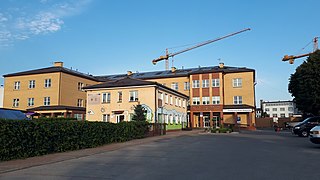
Academy of Economics in Białystok was opened on January 5, 1996. It is a non-governmental collegiate-level institution of higher education in the city of Białystok, one of several such institutions including the largest University of Białystok locally. The academy was ranked in 2008 by the Polish edition of Newsweek as best in the Podlaskie Voivodeship. It offers bachelor's and master's degrees in three general fields of knowledge, as well as one-year postgraduate studies.

The ministries of Poland are the various departments performing functions implemented by the Polish government. Each ministry is headed by a governmental minister selected by the Prime Minister, who sits in the collective executive Council of Ministers. The current competences and regulations of the ministries were established under a series of central administrative reforms carried out by prime ministers Józef Oleksy and Włodzimierz Cimoszewicz between 1996 and 1997. Under legal regulations, the cabinet can create, combine, or dissolve ministries, with the Prime Minister determining the scope and responsibilities of ministers. The number and range of ministries has varied throughout the past.
Polish Ministry of Marine Economy was created on 5 May 2006 during the reshuffling of the government of Kazimierz Marcinkiewicz.

Ministry of Sport and Tourism of the Republic of Poland was created on August 23, 2005 by decision of the Council of Ministers under then-Prime Minister Marek Belka.

The Ministry of Science and Higher Education in Poland was opened on 5 May 2006 by the Minister of Science and Higher Education, in replacement of several parts of the Ministry of Education and Science. The Minister of Science and Higher Education administers governmental activities in science and higher education and has a budget for scientific research provided by State funds. The Rada Nauki acts together with the Minister, in replacement of the Komitet Badań Naukowych which was closed in 2005. The headquarters of the ministry are located at ulica Wspólna 1/3, Warsaw.

The Ministry of Regional Development was a ministerial department within the government of Poland. The ministry was created under the premiership of Kazimierz Marcinkiewicz on 31 October 2005, having its functions devolved from the previous Ministry of Economy and Labour. The department was merged with the Ministry of Transport, Construction and Marine Economy in November 2013 under Prime Minister Donald Tusk, creating the Ministry of Infrastructure and Development.
Bellona Publishing House is a private publishing house based in Warsaw, Poland. It was created in 1990 from restructuring of the state-run Wydawnictwo MON. It specialises in books on military history. Among the authors who published with Bellona are academic historians Henryk Samsonowicz, Lech Wyszczelski, Leszek Moczulski, and Tadeusz Panecki as well as journalists and writers like Krzysztof Daukszewicz, Grzegorz Miecugow, Magdalena Kozak. Bellona issues more than 300 books yearly. It is also the publisher of Mówią Wieki, a monthly historical magazine established in 1958.

Ministry of Transport, Construction and Maritime Economy was formed on 21 November 2011, from transformation of Ministry of Infrastructure.

Ministry of Economic Development was the office of government in Poland responsible for economy and regional development. Mateusz Morawiecki was the last Minister of Development. It was created in late 2015 from the split of the Ministry of Infrastructure and Development and dissolved in 2018, after creation of Ministry of Investment and Economic Development.

Ministry of Infrastructure and Construction was the office of government in Poland responsible for construction and infrastructure. Andrzej Adamczyk was the only Minister of Infrastructure and Construction. It was created in late 2015 from the split of the Ministry of Infrastructure and Development, in 2018 became Ministry of Infrastructure.

Halina Weronika Wasilewska-Trenkner was a Polish economist, academic and finance minister.

Ministry of Marine Economy and Inland Navigation was formed in 2015, from transformation of Ministry of Infrastructure and Development. It was dissolved in 2020.

The Ministry of Investment and Economic Development was an agency of the government of Poland. The ministry was headquartered in Warsaw and was formed from the Ministry of Development in 2018. Jerzy Kwieciński was the first and only Minister of Investment and Economic Development, serving from 9 January 2018 to 15 November 2019. It was succeeded by the Ministry of Funds and Regional Policy.

Ministry of Transportation and Construction was formed on 31 October 2005, from transformation of Ministry of Infrastructure.
Ministry of Transport and Maritime Economy of Poland since 2001 has been included in the competence of the Ministry of Infrastructure.
Ministry of Economic Cooperation with Foreign Countries was a Polish government administration office, its tasks included implementation of state policy and coordination of activities in the field of economic, trade and scientific and technical relations with foreign countries.

Ministry of Economy, Labour and Social Policy is a Polish abolished government administration office serving the minister in charge of economy, labor, regional development, tourism, social security.
Ministry of Construction is an abolished Polish government administration office serving the minister in charge of construction, spatial management and housing.
The Aestian Island is a tentative name of an artificial island under construction by Poland in the Vistula Lagoon as a land fill project, with the infill obtained from the digging of the Vistula Spit canal. The island will cover the area of c. 180–200 hectares, in the shape of an ellipse with 1932 m and 1192 m axes. It is expected to become a wild-bird habitat. Its location is in the central part of the lagoon about 2.5 km off the Vistula Spit, approximately opposite the village of Przebrno.

The Ministry of Climate (MoC) was a Polish government ministry responsible for energy and climate protection from 2019 to 2020.











